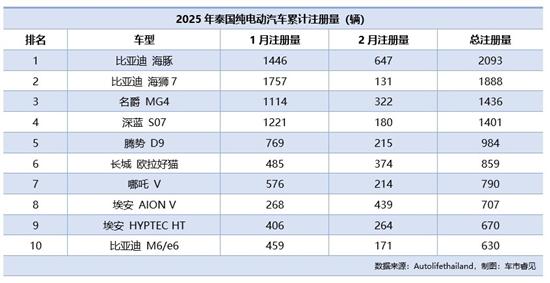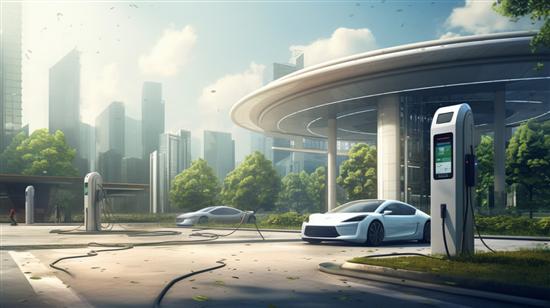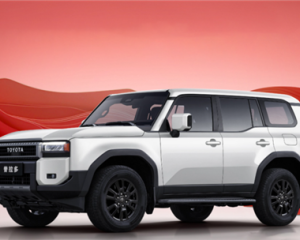Thailand: Pure Electric Vehicle Sales in February Declined, BYD Remains the Sales Leader

According to foreign media reports, in February 2025, the number of pure electric vehicle registrations in Thailand was 5,164, an increase of 42.1% over the same period in February 2024, but a month-on-month decrease of 58.3% compared with the registration of 12,376 vehicles in January 2025. BYD Dolphin became the sales champion with 647 registrations and a market share of 12.5%.
Malaysia: Electric vehicles sold in Malaysia must be equipped with external sound warning devices as standard starting from 2026

The Malaysian Road Transport Department (JPJ) recently announced the new car registration data for February 2025. The local brand Perodua still sits firmly on the sales champion throne, with a total of 31,382 new cars registered in February, more than three times the registration volume of the runner-up Proton. This year, Perodua's cumulative registration volume reached 54,627, far ahead of Proton's 20,756. Jaecoo, a sub-brand of the Chinese brand Chery, made a strong comeback in February, jumping to the fifth place with 1,684 registrations, more than doubling from the previous month. In addition, Tesla achieved an amazing increase. The brand registered only 13 vehicles in January, but the registration volume soared to 443 vehicles in February, indicating that the market demand for it is still strong.
Focusing on the electric vehicle market segment, in February, the local brand Proton eMas 7 once again topped the list of best-selling electric vehicles, followed by BYD Sealion7 (Sea Lion 07 EV), which received 387 registrations. The third place winner was Tesla Model 3, which had 377 registrations. The new force brand Xiaopeng G6 ranked fourth.
From January 1, 2026, all pure electric and hybrid/plug-in hybrid models sold in Malaysia must be equipped with external sound warning devices as standard. According to the new regulations, when the vehicle is traveling at a speed of 20km/h or below, the system will automatically play a warning sound through the external speaker to remind pedestrians and cyclists around to pay attention to approaching vehicles in the visual blind spot. This policy aims to solve the road safety risks caused by the silent characteristics of electric vehicles.
Indonesia: Chinese auto brands increase to 16, aiming to achieve annual production capacity of 250,000 electric vehicles
Chinese cars are becoming increasingly active in the Indonesian auto market. With the recent entry of Xiaopeng Motors, the number of Chinese brands in Indonesia has increased to 16, surpassing Japanese brands (13). Yohannes Nangoi, chairman of the Indonesian Automotive Industry Association (GAIKINDO), pointed out that Indonesia is attracting global automakers to compete for layout. He particularly emphasized that Chinese automakers are investing in factories with unprecedented strength, and this industry siphon effect will accelerate the transformation and upgrading of Indonesia's auto industry.
In addition, the Indonesian Ministry of Industry shows that with the heavy investment of Chinese automakers such as BYD and Geely, Indonesia's annual production capacity of electric vehicles is expected to surge from the current 70,000 vehicles to 251,000 vehicles by the end of 2025. Currently, there are 10 electric vehicle manufacturers in Indonesia, among which BYD's Subang plant in West Java leads with an annual production capacity of 150,000 vehicles and a total investment of 11.7 trillion rupiah (about 5.1 billion yuan). The technology transfer and capital injection brought by Chinese brands are driving Indonesia's transformation from a resource exporter to a new energy manufacturing center.
Vietnam: Inventory is high, 2024 models have seen significant price cuts
According to local media reports in Vietnam, the Vietnamese passenger car market will undergo a major transformation in 2025, and the 2024 models are experiencing a significant price cut. According to data from the General Statistics Office of Vietnam, the total national automobile inventory will reach 620,700 vehicles in 2024 (including imported vehicles and 2023 backlog inventory), but only 510,000 vehicles will be consumed throughout the year, forming a supply inventory of more than 110,000 vehicles. In order to accelerate inventory reduction, automakers have introduced a variety of stimulus measures, providing Vietnamese consumers with car purchase opportunities through strategies such as cash rebates, low loan interest rates, and extended warranty periods.

